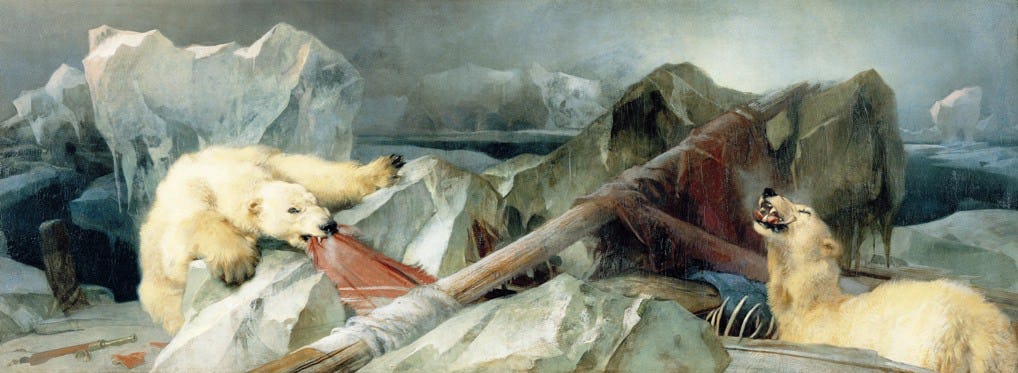TAI Bookshelf Podcast - Debunking Arctic Exploration Narratives with Greg Sharp and Christian Drury

Man Proposes, God Disposes (Edwin Henry Landseer, 1864 – Royal Holloway, University of London)
The Arctic Institute’s Bookshelf Podcast is back with its second series! This season, your favorite hosts Liubov Timonina and Romain Chuffart are joined by a new host, Saga Helgason. Together they chat with scholars and experts to make the Arctic easy and accessible to everyone. Tune in every other week and join our in-depth conversations that take you beyond the headlines and right into the latest ideas, challenges, and experiences from the Arctic.
In this week’s episode, Romain and Liuba had a conversation with TAI Senior Fellow Gregor Sharp (UBC) and Christian Drury (Durham University). They talked about Arctic exploration and its effects on how we talk about and see the Arctic, past and present. Greg and Christian looked at different aspects of colonial imaginations and practices focusing on how the history of Arctic exploration can be used to understand current perceptions and international politics. We uncover some misconceptions along the way and reflect on our own positionality and responsibility as researchers within Western academia.
Gregor Sharp is a PhD candidate at the University of British Columbia (UBC) in Vancouver and a Senior Fellow at The Arctic Institute. Gregor’s current research examines the implications of frontiers for international relations. His previous research has ranged from looking at the implications of hydrocarbon extraction in Canada’s North to interrogating Arctic politics from a critical theory perspective.
Christian Drury is a DurhamARCTIC PhD candidate at Durham University. His current research looks at British exploration, travel and tourism in the Arctic in the late nineteenth and early twentieth centuries, particularly representations of modernity and landscape. His work focuses on how the Arctic was imagined as an empty space in European travel writing, as well as relationships between travellers and indigenous peoples in the Arctic. Drawing on both historical and literary sources, his research considers the significance of enduring imaginative geographies of the Arctic.
References and further readings:
- Bravo, Michael. North Pole: Nature and Culture. London, UK: Reaktion Books, 2019.
- Cavell, Janice. “Going Native in the North: Reconsidering British Attitudes during the Franklin Search, 1848-1859.” Polar Record 45, no. 1 (2009): 25–35. https://doi.org/10.1017/S0032247408007511.
- Cavell, Janice. Tracing the Connected Narrative: Arctic Exploration in British Print Culture, 1818-1860. Toronto, ON: University of Toronto Press, 2008.
- Cronin, Marionne. “Technological Heroes: Images of the Arctic in the Age of Polar Aviation.” In Northscapes : History, Technology, and the Making of Northern Environments, edited by Sverker Sörlin and Dolly Jørgensen. Vancouver, BC: University of British Columbia Press, 2013.
- Hansen, Peter H. The Summits of Modern Man: Mountaineering after the Enlightenment. Cambridge, MA: Harvard University Press, 2013.
- Smith, Jen Rose. “‘Exceeding Beringia’: Upending Universal Human Events and Wayward Transits in Arctic Spaces.” Environment and Planning D: Society and Space 39, no. 1 (2020): 158–75. https://doi.org/10.1177/0263775820950745.
- Stuhl, Andrew. “The Politics of the ‘New North’: Putting History and Geography at Stake in Arctic Futures.” The Polar Journal 3, no. 1 (2013): 94–119. https://www.tandfonline.com/doi/abs/10.1080/2154896X.2013.783280.
This episode was recorded in March 2021.